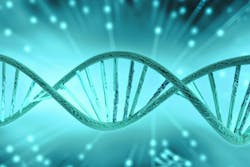Monitoring levels of DNA shed by tumors and circulating in the bloodstream could help doctors accurately assess how gastroesophageal cancers are responding to treatment, and potentially predict future prognosis, suggests a new study led by researchers at the Johns Hopkins Kimmel Cancer Center and its Bloomberg~Kimmel Institute for Cancer Immunotherapy.
The study tracked minimal residual disease (the amount of cancer left following treatment) by analyzing circulating tumor DNA (ctDNA), showing how these “liquid biopsies” can provide valuable insights into treatment outcomes over time. Absence of ctDNA was seen occurring together with specific activation of T cells that are part of the immune system’s defense to recognize and fight cancer.
The findings, reported in a paper published March 19 in Nature Medicine, emerged from a clinical trial examining the safety and efficacy of two immunotherapy drugs — nivolumab and relatlimab —as part of pre-operative treatment for patients with operable esophageal and gastroesophageal junction cancer.
The trial included 32 patients with operable esophageal or gastroesophageal junction cancer, who received nivolumab either alone or in combination with relatlimab prior to and during their standard treatment of chemotherapy and radiation. The drugs tested are both immune checkpoint inhibitors, which prevent cancer cells from dampening the body’s anti-cancer immune response. Researchers used liquid biopsies — tests that monitor trace levels of tumor DNA shed into the bloodstream —at different timepoints during treatment. They also measured levels of tumor-recognizing T cells and other components of tumor-specific immune responses.
About 40% of those in the nivolumab arm and 21.4% in the combination arm had a pathological complete response, meaning there was no evidence of cancer at the time of surgery. Over half of patients in both arms had a major pathological response, meaning less than 10% of cancer cells were remaining at the time of surgery.
“Historically, about two-thirds of patients treated with standard chemoradiation prior to surgery are alive after two years,” says senior study co-author Vincent Lam, M.D., director of the Esophageal Cancer Research Program and an assistant professor of oncology at Johns Hopkins. “In our study, some 72.5% of participants had no signs of cancer and 82.6% were still living after two years. Notably, patients with undetectable ctDNA at different timepoints following immunotherapy had significantly longer cancer-free survival.”

